An Interview with Victor Wooten
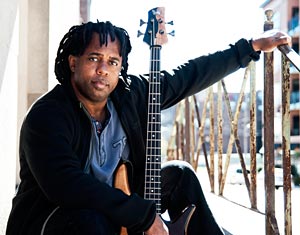 Fifteen years ago, Victor Wooten released a solo electric bass album that inspired countless bassists to push themselves to new limits. Today, you’d be hard pressed to find a “best of” or “reader’s choice” list of top bassists without him.
Fifteen years ago, Victor Wooten released a solo electric bass album that inspired countless bassists to push themselves to new limits. Today, you’d be hard pressed to find a “best of” or “reader’s choice” list of top bassists without him.
Victor is a busy bassist, teacher, and more recently, record label owner. We caught up with him during one of his stops on the Spring Road Trip Summer 2011 tour with Stanley Clarke, to discuss his new album, label, the Flecktones, his camps, and his career so far.
What is it about bass that keeps you playing every day?
I would say it’s less and less about bass as I get older, and it’s more and more about music and connecting with people. It’s almost like you having a bass voice or a tenor voice. It’s not so much about the pitch of your voice that keeps you talking. It’s about having something to say and communicating with people. I just happen to do it on a bass. And I like the bass in general, because the bass is designed as a support role by nature. The whole role of our instrument is made to make other people sound good and make other people feel comfortable, so I like that just from the nature of the instrument. But I would say not even that keeps me going every day… I think it’s just the relationship with the people, you know? Because I’d probably do it anyway, but probably not every day if I wasn’t doing it on tour. So I think it’s the people… the people that come to hear it. I hadn’t thought of it… [that] was a good question.
You just released A Show Of Hands 15. Tell us a little about what brought that about.
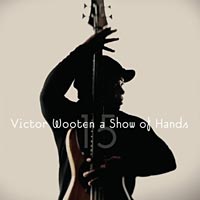 I had originally planned on releasing or recording another strictly solo bass record, 10 years after the first one. That’s what I thought. But 10 years came and it didn’t feel necessary to me. It didn’t feel like I needed to make that statement again. For one, because there were many other bass players making that statement and doing it well. You know, Michael Manring had solo bass records and not even all the people were making the bass records but people were capable of it. There were people now doing solo shows… you know, we were meeting people at camps. Steve Bailey actually had a solo bass competition… we heard great stuff. So it just didn’t feel like I needed to do it again.
I had originally planned on releasing or recording another strictly solo bass record, 10 years after the first one. That’s what I thought. But 10 years came and it didn’t feel necessary to me. It didn’t feel like I needed to make that statement again. For one, because there were many other bass players making that statement and doing it well. You know, Michael Manring had solo bass records and not even all the people were making the bass records but people were capable of it. There were people now doing solo shows… you know, we were meeting people at camps. Steve Bailey actually had a solo bass competition… we heard great stuff. So it just didn’t feel like I needed to do it again.
So here it was on the 15th year anniversary of A Show Of Hands. I had been toying with the idea of just putting out my own records instead of going through other record labels… just start my own and be more in control of everything. And with the thought of that and the thought of ‘man, this is the 15th anniversary of that record and it’s still selling, it’s my biggest seller, new bass players are still getting into it, we should do something.’ Then talking with my manager, we said, ‘wow, it’s a good time to do my own record, and this is a good way to start. And I don’t have to go in the studio and re-record a whole new record, so I don’t need a huge budget. Let’s just try it out by releasing this record on your own. There are still people who wanna hear it.’
Technology is better now so we can make it even sound better, and then add some extra tracks so that people that already have it get something new. So it’s kind of a combination of a bunch of things.
So it’s been 15 years. How do you think your playing has changed… how do you think you’ve changed?
Well, a lot more years, a lot less hair. Hopefully I’m a better musician. A better person. I hate to compare myself to this person – well no I don’t – but it’s almost like when Michael Jordan got a little older. He changed his game to where he didn’t have to dunk the ball every time. He found another way to win, and actually became a better player, included his team more, passed the ball more, hit the fade-away jump shot, you know. I look at it kind of that way. I don’t feel the urge to have to dunk the ball all the time. I like teaching other people how to dunk the ball, but I don’t feel the urge to do it. And a lot has to do with having four kids now, and you know I’ve been married for 16 years. Life changes and life goes on. It’s not as much about me, maybe, as it used to be, and I think that’s a good thing. So hopefully that shows in my playing.
You said that A Show Of Hands 15 was one of the reasons for making VIX records. Was there another turning point that just stopped you where you said, “I have to make my own record label?”
Just after dealing with record labels period, you know. This is going to sound mean, and maybe it should be, but most labels are not set up on the artist’s behalf, and it’s the artist that’s generating the money. The artist is actually paying most record labels, because we’re generating the money and making them able to do things, but we get the short end of the stick. When a record sells for $15, where does the $15 go? I think the general public thinks it goes to the artist, but the artist is lucky if he gets $2 for a CD. You have to have a good deal to get two bucks. To me, that’s a shame.
And record labels will tell you all sorts of things as to why that is. You know, “we’re paying for this, we’re paying for that.” But even when a record label recoups their expenses, they still get the big end, and you get the short end. Why? No one will tell you that, you know? So, we live in a day and age where it’s a whole lot easier to put out your own record. There are no more record stores. You have to go to a coffee shop to buy a CD, or a bookstore. Nowadays, things are done more on the internet. I can reach a dude in China at the push of a button. So, it’s easier to release my records on my own, and I feel that I’m in a prime position because I’m fortunate enough to already have a fan base. So the two elements to get someone to buy something is they have to know what is it, and they have to know where to get it. And I think I can provide those two elements.
Providing the product is easy. Getting people to know about it and purchase it is the difficult part, especially in a day and age when everyone wants it for free. “Why am I gonna buy your CD when I can go and download it?” So we try to offer incentives to purchase. I want to make everybody feel good… feel good to purchase it from me and not get it for free. So, hopefully we’re doing it.
The VIX Records site actually says that this is going to be the first release of 2011. Does that mean we will get to see another?
Sure, sure. In a few months I’m going to do a soft release… it’ll be a soundtrack album to my audiobook. I released an audiobook to The Music Lesson, and it has a lot of music on it. So I pulled all that music aside and I’m going to release a CD of just that music. So the way people do a soundtrack to a movie, I’m doing a soundtrack to an audiobook. And then, very possible, very probable, if all goes as planned, we’re going to release around September a CD for JD Blair, the drummer that I’ve been working with for years. We’re gonna release his music on VIX Records. And then next year, I’ll release my own CD again. So we’re gonna keep the label active, and it won’t just be my music.
As if you don’t have enough going for you, the Flecktones are coming back. What brought that around?
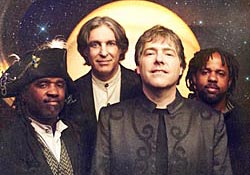 It was time. You know, it was time for us to do something. The last record we had out was the Christmas record a few years ago. We toured that three years in a row for the Christmas season. As fun as it was, I think we’d all had enough of that, and we had taken a long time off. The last three years, just about all we had done was the months of November and December. Everybody was doing their separate things. So, we had talked over the years about what we wanted to do next, concluding with doing a record with our former member, Howard Levy. The first thing we did was a tour for a few weeks with Howard just for fun, playing some of that old music and having a good time. Then we decided to do a record, and we just recorded a new record [Rocket Science], and that I think should be out in May.
It was time. You know, it was time for us to do something. The last record we had out was the Christmas record a few years ago. We toured that three years in a row for the Christmas season. As fun as it was, I think we’d all had enough of that, and we had taken a long time off. The last three years, just about all we had done was the months of November and December. Everybody was doing their separate things. So, we had talked over the years about what we wanted to do next, concluding with doing a record with our former member, Howard Levy. The first thing we did was a tour for a few weeks with Howard just for fun, playing some of that old music and having a good time. Then we decided to do a record, and we just recorded a new record [Rocket Science], and that I think should be out in May.
So you have the re-release and the reunion… is this a time of retrospect for you or is it just all coming together that way?
I think it just happened that way. Sometimes things happen and coincide that way and we don’t even realize it. But I don’t think it was done on purpose.
What do you have lined up for your summer camps at Wooten Woods this year?
Our first camp of 2011 is coming up at the end of April, starting a big season. We have all sorts of things going on: different camps and camps for different instruments, too. So people should check it out at my website, and come join us. We’ve got a great host of instructors, and I’m definitely not the only instructor there, but I am there 100% of the time. Anthony [Wellington] is there, Steve Bailey, Chuck Rainey, there’s a whole bunch of people that pop in, and there’s always surprise guests that we don’t tell you that are coming. Past surprise guests have been Stanley Clarke, Marcus Miller, Rhonda Smith, Esperanza Spalding, drummer Dennis Chambers, and people like that. We get all kinds that show up. And sometimes we’ll bring in some unknown people that have a lot to say and teach.
There’s a whole staff of nature instructors that do a lot of awareness exercises, a lot of blindfolded work so that you learn to raise the level of the other senses. A lot of times we can approach music one way, so it gets kind of different… it gets real different out there. But you learn the basics, too. We make sure everyone leaves our camp knowing how to read music, make sure that all the bass players get their hands on a double bass, you know different fundamental things like that. But we also do a lot of exercises that help you understand music from a more complete way, rather than just notes and scales and techniques. There’s other things involved, so we try to turn you on to those things, too.
Where do you see the future of slap and pop going?
[laughs] Somebody asked Jaco “what was the future of jazz bass?” or something like that, and he said, “well tomorrow I’ll be on a bus to…” [laughs].
I hope it becomes more musical. Right now, the young players are learning it as a technique and nothing more, or maybe just a flashy technique. And it’s almost like we forget that we’re supposed to be playing music with it.
When Larry Graham invented the technique and Louis Johnson took it over, it was so musical. Now, with people like Marcus [Miller] and Abe Laboriel and myself adding even more technique to it, it’s the technique that’s been getting the attention, not the musicality. And Marcus, he’s got a great technique, hopefully myself too, but we’re still using it musically, it’s not just icing on the cake. Or maybe it’s just icing on the cake, but as I like to say if you stick your fork in a cake and it’s all icing, you get disappointed. And I think a lot of people have more icing than we do cake, so we’ve gotten out of balance. So I hope the future of slap bass as we call it is that it becomes more musical, but sadly I’m not seeing it yet. But I have faith, I believe it’s coming.
Are there going to be any more SMV (Stanley Clarke, Marcus Miller, Victor Wooten) projects in the future?
All I can say is I hope so, but I can’t speak for the other people. It took a lot to get that together, so yea I hope it happens again.
Do you feel conventional bass lessons centered around theory are as effective as focusing on all elements of music in a lesson?
That depends on the student. I can’t make a general statement not knowing the student. You have to teach the student what he needs to learn.
If you have a student that can groove and work hard and play really well but doesn’t know the notes on his instrument, teach him theory. But if you have a student that has a lot of theory but can’t play and can’t get a gig, teach him how to groove. So what’s effective would depend on the student, really. And the teacher and how they teach and the relationship between the two. But I can’t make a statement about what’s going to be more effective if I don’t know what the student needs.
Which act or artist would you most enjoy being able to feature on a future album or project.
I want to do an album with double bass one day in the near future. And even strings, like an orchestral project but definitely double bass. Stanley’s got me inspired.
How much do you get to play double bass?
Not much. Only when I’m home and have a little bit of free time at night once the kids have gone to bed, I’ll get it out, but not a lot. But I’m making myself work on it now. I have two good basses. I got them both fixed so they feel great, they sound great, now the rest is up to me.
One of our Facebook friends asked us to ask you this (and many more “Liked” it), so here goes… Have you ever faked the funk on a nasty dunk?
Hmm, I’m trying to really understand what that means… I don’t know that I’ve ever faked the funk. I’ve faked the dunk. I don’t even know how to fake the funk, but at 5’5”, I have to fake a few dunks.
I had to look that up, apparently it’s from a Shaq commercial.
Shaq has faked a few free throws.
[Editor’s note: A special thanks to our Facebook friends who suggested some of these questions: Tony Tapefoot, Gary Comley, Alex Kalicinski, Thomas Scott, Steven Dennett and Eric Osmanoglu]

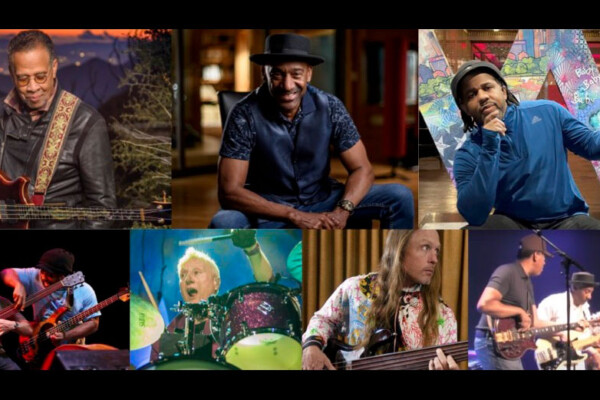
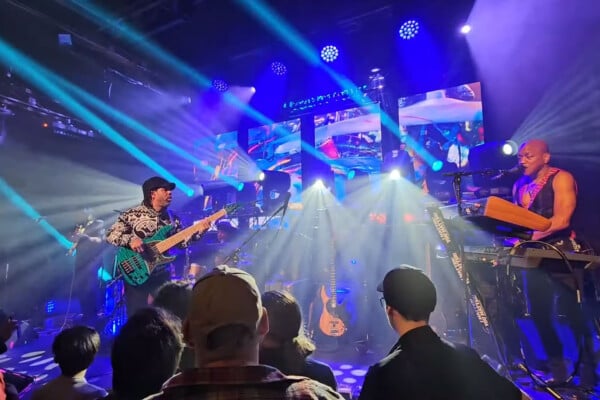
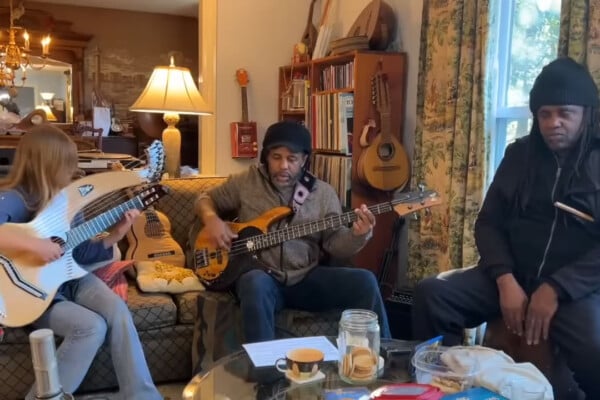
Happy B-Lated Birthday: Sorry I missed you in NYC. Catch up W/U; If you come up 2 Albany,NY. You and family take care, had a great time with you & and your family when, You& JD were & the Egg in Albany. Peace/ Daveed Weatherly